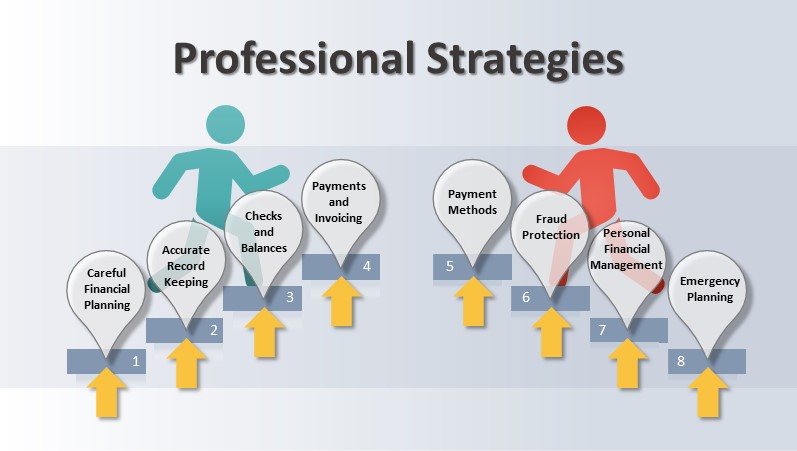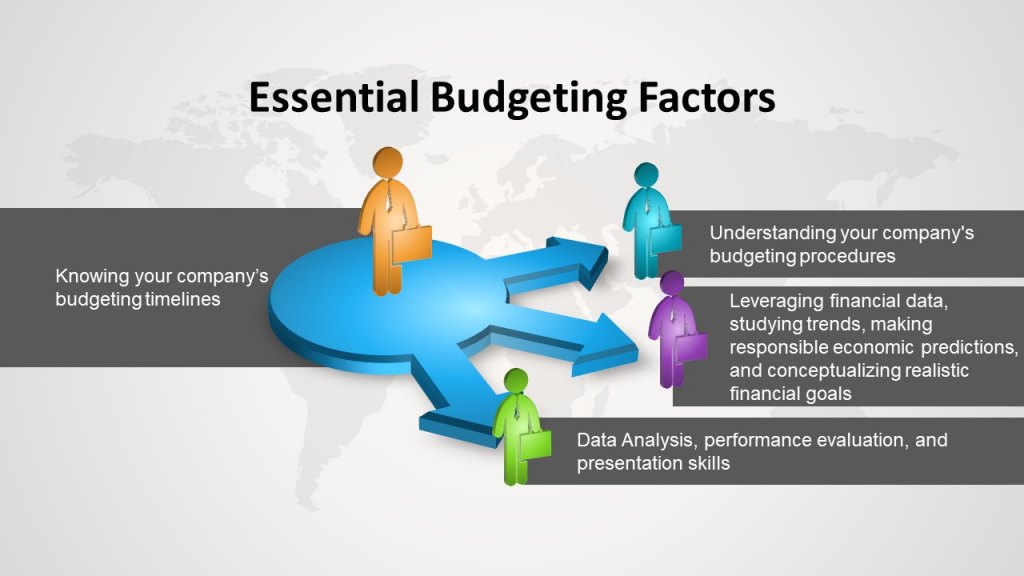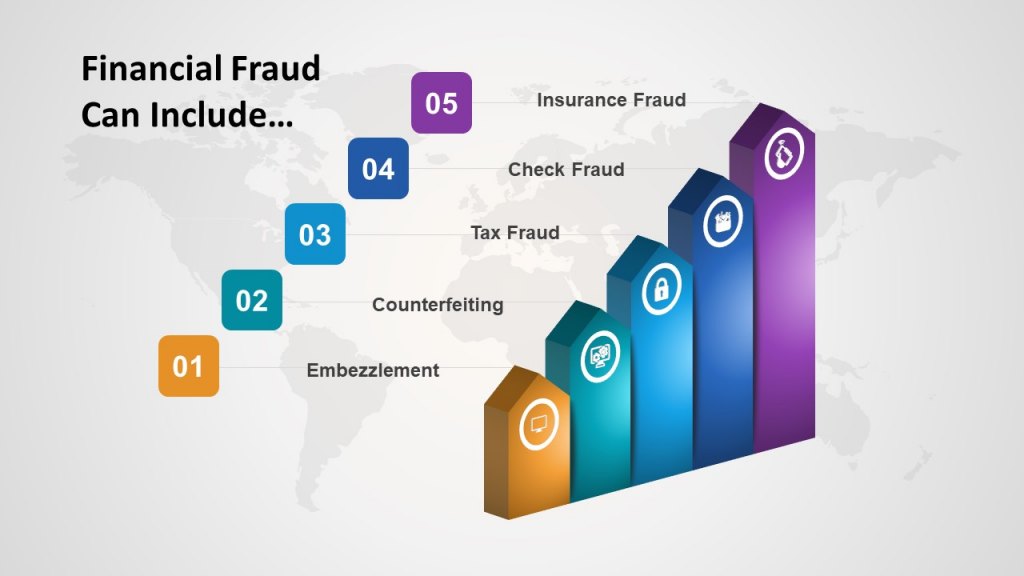Running a small business is a challenging task, especially as most times, the company owner singlehandedly handles almost all business operations.
Therefore, it is highly possible for one aspect of the business to suffer as it is virtually impossible to allocate adequate time to all business areas.
The majority of startup founders dedicate most of their time and energy to branding, sales, and marketing to ensure their company’s growth.
However, this often results in neglecting cash flow management or pushing it to the back burner.
Without proper financial management, a business is doomed to fail, regardless of how unique the marketing strategies are or how innovative the products.
Below are several strategies to follow If you want to avoid financial disaster as a small business owner.
These professional strategies include:
- Careful financial planning
- Accurate record keeping
- Checks and balances
- Payments and invoicing
- Payment methods
- Fraud protection
- Personal financial management
- Emergency Planning

Carefully Plan Your Finances
Financial planning is an essential step when running or starting a small business. It involves forecasting future economic outcomes such as income and expenses to ensure you are getting the most of your resources to achieve financial success.
The old adage, “Those who fail to plan, plan to fail,” holds true in economics and business financial management.
Without diligent financial planning, businesses face a number of significant risks, including:
- Failure to meet financial goals and to service debts
- Inability to save or increase capital
- Loss of financial control
- Increased debt
- Unable to manage contingencies
- Increased labor costs
- A reduction in profit margins
Ensure Financial Records Meet Industry and Government Standards
Effective bookkeeping is the backbone of any business as it allows you to keep track of your revenue and expenses, stay up to date with your taxes, as well as other necessary payments.
It is important that you maintain your financial records according to the guidelines provided by the government and your industry.
Keeping to these standards will help you avoid tax problems which can lead to the closure of your business.
According to the IRS, you should keep records to:
- Monitor your business progress
- Track deductible expenses
- Assist in preparing business financial statements and tax returns with supporting documentation
The types of records you should keep include business income and expenses. Be sure to keep track of sales, payroll, business purchases, and any other transactions that substantiate your tax returns’ financial information.
You would also avoid sanctions and fines that can eat into your revenue. You can choose to use high-quality accounting software to maintain your records or hire a professional to ensure that your bookkeeping is on the right track.
Looking to outsource your bookkeeping needs? Here are some things to look for before bringing on an outsourced resource:
- Good communication skills
- Skilled in using a range of accounting software and new technologies
- Organization and teamwork skills
- Experience in your niche or industry
- Integrity and reliability
- Able to work remotely
- Capable of adaptation
- Excellent reporting skills, time management, and accountability
Check and Modify Budgets Regularly
A budget is a necessary tool that every business needs to achieve success and continuous growth.
Before drawing up a budget, examine your financial records to get a clear view of your expenses and income.
Form a prediction of how your income would fare in the coming weeks or months. With this information in mind, create a budget that includes all your expenditures and revenue for the future.
Not only would an accurate budget help you to plan ahead, but it will also allow you to clearly visualize areas that need more money and where to cut costs.
Devise new marketing strategies or provide unique solutions to increase sales. You can also go for alternatives such as outsourcing work and reviewing utility contracts to save money.
Set a date to review the budget, either monthly or quarterly and ensure to modify it according to the previous month or quarter results.
Some of the more essential budgeting factors will include:
- Knowing your company’s budgeting timelines
- Understanding your company’s budgeting procedures
- Leveraging financial data, studying trends, making responsible economic predictions, and conceptualizing realistic financial goals
- Data Analysis, performance evaluation, and presentation skills

Keep Track of Invoices and Payments
Revenue generated from sales is one of the most important driving forces of a successful business.
Too many late or missed payments can drive a company into the ground. Hence, it is essential to stay on top of bills and invoices, ensuring that payments are made when due.
Always send reminders to clients a few weeks or days before the due date. Provide various payment methods to make it easy for the client to pay.
If possible, use software to keep track of sent invoices, reminders, and follow-up on late payments.
A software program that automatically updates your financial records when payments are made would help you maintain your books with ease. Some of the more common software tools include:
- Xero (Financial Accounting Software)
- MYOB
- Expensify (Expense tracking)
- PlanGuru (Financial planning and budgeting)
- Approve.com (COS and spend management)
- FreshBooks (Billing and payment processing)
- BrightPay (Payroll Management tools)
- Gusto (Taxation tools)
- SOS Inventory (Inventory tracking)
Even in the digital age, managing the paper trail remains critical. Logbooks (for those in transport), for example, need to be maintained for legal purposes and paper receipts for petty cash transactions need to be produced on request.
Where digital tools are employed to help manage financial affairs, backups and possibly even hard copies must be carefully cataloged and maintained.
Payment Methods Should Be Industry Compliant
The payment methods offered by your store should be easy to use and protect customers from fraud and identity theft.
You must ensure that all payment gateways provided by your business are compliant with industry standards.
Payment Card Industry (PCI) compliance is a system offered by credit and debit card companies to protect businesses from hackers and fraud and safeguard consumers’ information.
The PCI compliance guide for small businesses contains all the rules that a company must follow to meet the standards of major card institutions and protect themselves from malicious individuals and credit card fraud.
Protect Your Business from Fraud
Credit card fraud has become rampant nowadays and is a significant factor responsible for the failure of most businesses.
Online payment fraud can result in massive losses for businesses. The most common types of online financial fraud are listed below. If some of these terms are unfamiliar to you, it’s a good idea to look them up:
- Phishing
- Spear-phishing
- Whaling
- Identity theft
- Lottery fee scams
- Online shopping frauds
- Work from home scams
- Stolen cards
- Invoice fraud
More broadly, and perhaps more traditionally, financial fraud can also include,
- Embezzlement
- Counterfeiting
- Tax fraud
- Check fraud
- Insurance fraud

To protect your business from fraud, carry out the following measures:
- Ensure your website is secured using a valid SSL certificate.
- Always update your antivirus and use recent security software.
- Avoid storing customers’ financial information in a local network in case of a data breach.
- Install a strong firewall to forestall all hacking attempts.
- If possible, use payment gateways or ecommerce systems that process payments without storing card information.
- Do not accept stolen cards and report all suspicious activities to the proper authorities.
- Keep abreast of new methods being used to scam and defraud to devise protective measures for your business.
Reporting will also be necessary where incidences of fraud are suspected or observed. Familiarize yourself with the reporting and record-keeping procedures involved with fraud claims or fraud reporting.
Take Care of Your Personal Finances
Sinking all your time, attention, and money into your business to the detriment of your personal finances would not do you any good.
When you put all your funds into your company and invest all revenue and profit back into the business, you are setting yourself up for a less than optimal retirement.
Set aside some money for personal use every month and save that money towards your retirement.
Build a portfolio and invest substantial amounts into stocks, bonds, or real estate. Look into different pension options provided by your government or financial institutions.
Plan for your future needs, your retirement, and consider your life insurance options to ensure that your family does not suffer financially after your death.
Having a plan in place for your personal finances allows you to devote your time and resources to your business, safe in the knowledge that your financial future is in order.
Some of the more common strategies for ensuring good personal financial management as a small business owner include:
- Keep private bank accounts separate from business bank accounts
- Separate all records
- Choose the proper legal and financial structure for your enterprise
- Diversify your income streams
- Separate your personal assets
- Manage debt separately
Be Prepared for Emergencies
No matter how optimistic you are as a small business owner, unforeseen events such as economic downturns, fire outbreaks, pandemics, and natural disasters are bound to happen.
To protect your business from bankruptcy or total collapse, you need to have a plan in place for when an emergency occurs.
The Small Business Association (SBA) offers the following suggestions on how to be prepared for emergencies and be in a better position to recover financially:
- Assess your business’s weaknesses and vulnerabilities to disasters like flooding, hurricanes, wildfires, and cyberattacks
- Create a recovery roadmap
- Prepare for and practice your recovery plan
- Check with the SBA to see if you are eligible for a loan to cover repair and replacement costs for declared disasters
Other steps to take include devising a protocol to follow in case of an emergency and making it known to your employees.
Set up a bank account and put money in it every month to serve as an emergency fund. Obtain necessary permits and certifications to make your business eligible for grants and relief funds.
Reflect on What Makes for Success
Most financial disasters occur because of a failure to plan and honestly assess the business or industry landscape.
Enthusiasm left untempered causes blind spots to business entrepreneurs, which leads to a neglect of basic financial checks and balances.
Running short on funds is easily the biggest risk factor for startups but can also impact more seasoned ventures.
Business owners are often aware of current expenditure and needs but fail to take into account contingencies that affect financial success.
Managers with limited experience or inexperience in leading and managing others can also lead to financial problems down the track.
Where efficiency and resource management – including human resources – are not monitored, a business can often be the victim of slow-creep financial losses that prevent innovation and effective crisis management.
In other words, good managers don’t wait until the day of disaster to figure out what should be done. They’ve already managed the risk in the way they handle day-to-day operations.
One of the most fundamental financial issues facing businesses is the issue of realism. Many business owners avoid addressing the actual costs of doing business because they are consumed with either the product, service, or end-user and not the mechanics that bring these things together successfully.
One of the ways to resolve this is to acknowledge it. Acknowledge the limitations of your own skill set and put people in place to manage those processes where you lack expertise.
If you are a visionary, go and be a visionary. But don’t blind yourself from the actual need to manage resources.
Engage someone who is talented in resource management. Not a people person? That’s fine. You stick to product development and find someone who knows how to manage work teams or customer relations.
You stick to building the things you love, creating the products and services you enjoy, and providing the innovation for which you are passionate.
And, make sure you have a talented team to support you in those areas you have the least talent or interest in – especially when it comes to the matter of your own business finances.























Leave a comment!